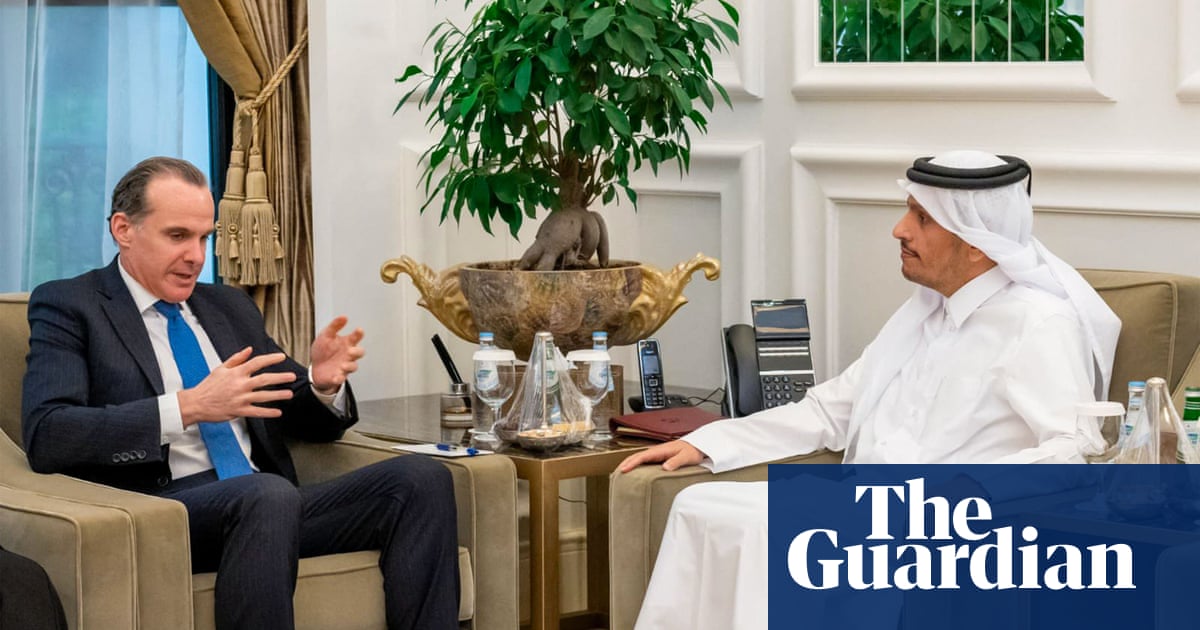
Only minor differences between Hamas and Israel remain to be resolved before a hostage deal can be struck, the Qatari prime minister has said.
Qatar has been at the centre of mediation efforts to reach an agreement that would lead to the release of large numbers of hostages, starting with children and women. A humanitarian pause lasting as long as five days would be agreed to allow the transport of the hostages.
Sheikh Mohammed Bin Abdulrahman Al Thani, at a joint press conference in Doha with Josep Borrell, the EU’s external affairs chief, said: “The challenges facing the agreement are just practical and logistical. There has been good progress in the past few days.”
“The deal is going through ups and downs from time to time throughout the last few weeks,” he said. “But I think that you know I’m now more confident that we are close enough to reach a deal that can bring the people safely back to their home.” He gave no timetable.
A staged release would be the first de-escalatory step since Hamas launched a bloody assault on Israel on 7 October, during which it captured more than 200 hostages and took them to Gaza.
So far only four hostages have been released, in two tranches. It is thought 239 people from 26 different countries are still being held, including some dual nationals.
Hamas has claimed that as many as 30 hostages have been killed by Israeli bombing of Gaza, but there is no independent verification of this and the claim may have been made to deter Israel from continuing its assault.
The Washington Post, citing people familiar with the deal, reported that Israel, the US and Hamas militants had reached a tentative agreement to free dozens of women and children held hostage in Gaza in exchange for a five-day pause in fighting.
The Israeli prime minister, Benjamin Netanyahu, said no deal had been reached. However, he is under conflicting domestic pressures to focus on the hostages while completing the elimination of Hamas as a military force capable of striking Israel again.
Brett McGurk, the US president’s senior adviser on the Middle East, said on Saturday the onus was on Hamas to release the hostages, and if it did so, there would be a humanitarian pause as well as a considerable increase in the flow of aid. He was speaking at an IISS security conference in Bahrain.
The Jordanian foreign minister, Ayman Safadi, said at the same conference that no preconditions should be set for a humanitarian pause.
Details of the negotiations, in an outline six-page paper, suggested any deal would include the release of some Palestinian political prisoners – the key demand being made by the Hamas military command.
Disputes have included the length of the ceasefire and whether women deemed to be combatants would be included in the first releases.
The International Committee of the Red Cross has been involved in identifying and verifying the identity of hostages, and it has tried to keep its role under the radar so as to ensure deals go ahead.
Al Thani did not hold back in his criticism of Israel, saying: “The disaster continues to worsen in Gaza in light of the international community’s inability to curb the aggression. The forced eviction that happened in the al-Shifa [hospital] complex is a crime, and unfortunately we did not hear any condemnation from the international community. Massacres continue against civilians, and there is no respect for international laws and norms.”
He added: “There is a double standard in many countries regarding what is happening to our brothers in Gaza. The massacres – the most recent of which took place at al-Fakhura school – prove Israel’s lack of respect for international laws.”
Borrell said Hamas had committed “the biggest massacre of Jews since the second world war” but that the UN had described what was happening in Gaza as carnage. He said: “One horror does not justify another horror.”
He said the vote of the UN security council last week calling for a pause was not just words but obligatory. He said the resolution had not been implemented, and that he had told the Israelis that the number of children being killed showed much more needed to be done to prevent deaths.
He said any humanitarian stage needed to be the first step to a political stage. “There is no point in providing food for one dinner and then to be killed the following day,” he said.
A number of countries, especially Arab states, have positioned aid so that it can flow into Gaza through the Rafah crossing in Egypt, and are still pressing Israel to allow goods through a crossing on its border.
Borrell praised the work of Qatar to bring about peace. “Qatar has emerged as a key negotiator not only in the Middle East, but in many other crises,” he said, citing Afghanistan, Iran and the release of captured children in Ukraine.
https://news.google.com/rss/articles/CBMiZmh0dHBzOi8vd3d3LnRoZWd1YXJkaWFuLmNvbS93b3JsZC8yMDIzL25vdi8xOS9pc3JhZWwtaGFtYXMtaG9zdGFnZS1kZWFsLW1lZGlhdGlvbi1xYXRhci1wcmltZS1taW5pc3RlctIBZmh0dHBzOi8vYW1wLnRoZWd1YXJkaWFuLmNvbS93b3JsZC8yMDIzL25vdi8xOS9pc3JhZWwtaGFtYXMtaG9zdGFnZS1kZWFsLW1lZGlhdGlvbi1xYXRhci1wcmltZS1taW5pc3Rlcg?oc=5
2023-11-19 13:13:00Z
2599361480
Tidak ada komentar:
Posting Komentar